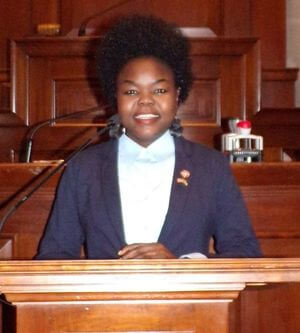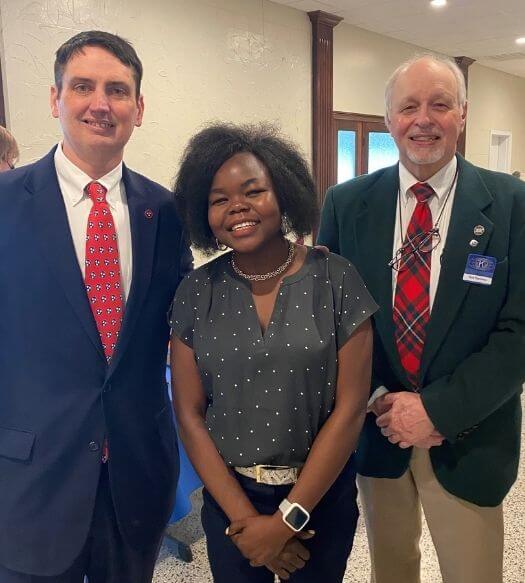International Women’s Day: From abandonment and torture to higher education and a legislative internship, MC’s Betty Asha is a profile in courage

It’s a Friday afternoon in between legislative sessions at the Tennessee General Assembly, and Maryville College junior Betty Asha ’23 finds a quiet place to chat about her academic internship with Sen. Raumesh Akbari (D-Memphis).
She’s sharply dressed and seems genuinely excited to discuss the details of her role, everything from managing the state senator’s schedule to answering phone calls to sitting in on committee meetings. For the semester, she’s completing a credit-bearing internship in political science, curricular practical training she obtained with the help of Tennessee Rep. Bob Ramsey, whose district includes parts of Blount County. As part of the official Legislative Internship Program, she was placed with Akbari based on her dual passions — business (Akbari serves on the Senate Commerce and Labor Committee) and education (the senator is vice-chair of the Senate Education Committee).
Those passions burn brightly and have since she made it her life’s goal to pursue knowledge and her own education no matter the cost — and although she’s paid a heavy price, she’s also gained immeasurably, she says. While she pauses to find the right word from time to time, her accent is the only sign that, just a few short years ago, she was a living in the jungles of South Sudan, cast out from her village, tortured by her fellow tribesmen and seemingly destined to become a casualty of that country’s violent civil war.
Asha, however, found salvation from a number of sources. An American missionary who befriended her and became an adoptive father. An East Tennessee community that lobbied to extract her from neighboring Uganda, where she fled … and helped more than 2,000 other Sudanese escape the fighting. And Maryville College, an institution that’s embraced her every bit as much as she’s embraced it, becoming a home away from home and a place where she’s currently pursuing a dual major in international business and political science.
“Maryville College has been so supportive, has stood by me, has nurtured me,” Asha says. “For example, the Academic Success Center: Because of the torture, I can’t hear from my right ear, and I get bad migraines and vertigo. But they worked with me to give me accommodations for that. And the professors — they allow you to come to them, so if you have questions or need help, they’re happy to work with you.”
A traumatic childhood

She speaks of Maryville College, and to a greater extent her thirst for knowledge and her love of learning, with passion. And, she adds, with good reason: Education, she says, literally saved her life. Born into the Kawka tribe, she lost her father when she was 8. Her mother remarried, and like many girls in her culture, she was expected to agree to an arranged marriage to a much older member of her tribe. She refused, and as a result, was tortured for three days by her fellow villagers. After a 1 ½-month recovery in the hospital, she was cast out by tribal elders.
The United Methodist Church’s mission organizations stepped in to enroll her in school, but at the time, she says with a laugh, she was “a terrible student.” Blount County resident Chris Hurley, however, saw something in the girl when he took part in a mission trip to South Sudan.
“My story inspired him to feel like he wanted to help me, to get me out of the jungle,” she says. “He came back in 2011 to visit, and I remember he had a book about Maryville College, and something struck me as I looked at it. I asked him if it was possible for me to continue my studies there, and he told me it would be possible, but it would be a little bit of work.”
In fact, educators at her school encouraged Hurley to find another candidate, because Asha’s grades were too low. He declined to give up on her, instead encouraging her to try harder. She took his advice to heart, never forgetting the pictures of the MC campus, and after obtaining her high school diploma, she set her sights on coming to America and attending Maryville College.
“When I finished my high school, I started figuring out what to do to make this goal of wanting to go to Maryville College possible,” she says. “What were the academic requirements? How do I make them happen? Well, I had to move to another country, and I only spoke a little English, so I had to find courses to help me meet these academic requirements.
“I had to work to get a passport, I had to get visas, traveling documents, a personal ID — and that took a year. I was the first person from my village to get a personal ID, and then I had to move to Uganda and take a couple of courses over there. And then I had to pursue a visa, but I was denied three times. But I just kept going, and every time they denied me, I had to figure out what else they wanted from me.”
Her work was sidetracked in 2013, however, when an insecure government was deposed by rival factions, and the country was consumed by civil war. The fighting was fierce, with Ugandan troops siding with the South Sudanese government against oppositional forces and a brokered ceasefire collapsing. While the conflict raged mainly between members of the Nuer and Dinka tribes, others were caught up in the chaos, which displaced roughly 4 million and led to an estimated 400,000 deaths.
Asha, however, refused to be a victim. In March 2016, she reached out to Hurley, asking for support to get another young orphan out of South Sudan and into the safety of United Nations refugee camps in Uganda. Hurley agreed to do what he could, given his limited capabilities back in Tennessee, but Asha found a way to turn financial support into lifesaving measures. She procured trucks, cars and motorcycles to ferry South Sudanese refugees fleeing the conflict down goat trails, dry riverbeds and abandoned roads to Camp Rhino, a U.N. settlement on the Albert Nile River in Uganda.
Over a 30-day period in the summer of 2016, she bribed government officials, avoided rebels and government soldiers and traversed often inhospitable terrain to bring almost 2,300 refugees to safety — including some of the villagers who had tortured her as a girl. Her heroism made her advocates in the United States, including Hurley’s fellow congregants at First United Methodist Church of Maryville, even more determined to bring her to the College she longed to attend. Ahmed Abdelrahman, Maryville College assistant director of international admissions, worked tirelessly to help Hurley and Asha’s other benefactors navigate international requirements and political red tape, and with the aid of former First Lady Melania Trump, Asha says, she was finally able to realize her dream.
Maryville College at last
“Maryville College has been so supportive, standing by me and nurturing me,” she says. “When I got here, I couldn’t speak English well, but they had these ESL (English as a Second Language) programs that helped me so much. The Academic Success Center, all of the professors, they saw something in me and saw a need for me to be here, and I’m very grateful.”
And, she adds, she’s determined to pay it forward. In February 2020, the warring factions in the South Sudanese Civil War brokered a peace deal and formed a unified national government, and while it’s a tentative peace, it opens the doors for ways in which Asha can take what she learns at Maryville College and one day use it to help her country.
“This is actually a foot in the door for me to see how things are supposed to be done,” she says. “My country is not stable, but that actually gives me a chance to see, ‘Oh, this is how it’s should be!’ The lawmakers, they argue about bills, and they voice their opinions, and they have different perspectives about things, but they disagree while respecting one another’s opinions. It’s amazing how people disagree without hating each other or shooting each other.”
For the time being, her student visa will allow her to stay in the United States as long as she continues her studies. After her internship is complete, she’ll work on her senior study and continue her course work to complete her undergraduate degree, and after that, she plans to continue on to law school or graduate school. She’s still figuring out the best path forward, because regardless of the route to get there, the end goal has been the same since she left South Sudan: to one day return home and help her people.
“My No. 1 is, and it’s always been my goal, is to be a living example for the people of South Sudan,” she says. “I want to be an inspiration and a voice for them at the same time, but with that being said, I want to go back and get a job with the government.
“My testimony will always be, look at what education has done and done in my life. Where I come from, young girls need to be encouraged to go to school and have to be given the opportunity to go regardless of cultural beliefs, regardless of some of the circumstances that lead people to think that sending a girl to get married is the only way out for them.
“That’s not solving the problem; it’s only making it worse,” she adds. “We must encourage gender equality and the education of women, because it’s done so much in my life. I chose education, and it’s taken me to the right places that make a difference.”